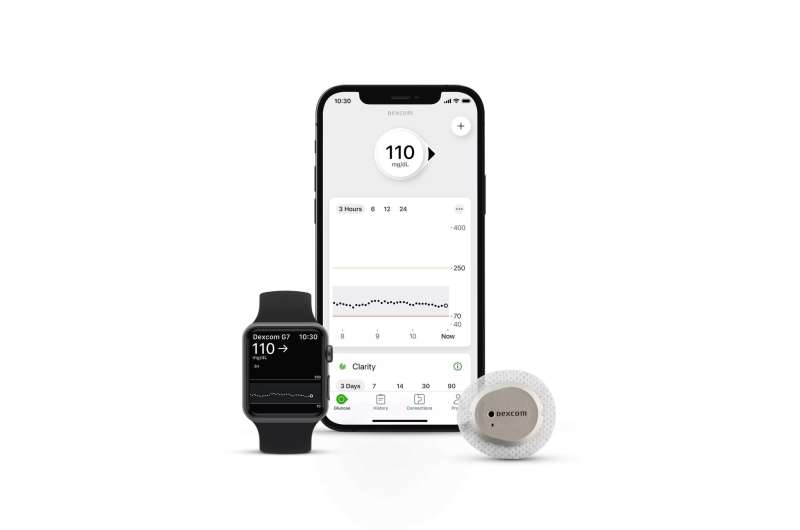This article has been reviewed according to Science X's editorial process and policies. Editors have highlighted the following attributes while ensuring the content's credibility:
fact-checked
reputable news agency
proofread
Company's new wearable device will help diabetics eat right, lose weight

San Diego's Dexcom, a maker of continuous glucose monitors, laid out plans for a new wearable device coming in 2024 for people with Type 2 diabetes who don't need insulin—a move that could help bring wearable health monitors closer to the mainstream.
At an investor presentation ahead of the American Diabetes Association convention in San Diego last weekend, Dexcom Chief Executive Kevin Sayer said the new product would have a 15-day sensor, software tailored to non-insulin blood sugar management and a cash-pay option, which aims to spark adoption within the 28 million Americans with Type 2 diabetes prior to potential coverage from Medicare and health insurers.
"There are three key decisions that somebody with Type 2 diabetes who is not taking insulin makes," said Sayer. "Those decisions are exercise, food and meds. And with this system, they can look at their meal planning. They can look at their exercise. They can look at whatever meds they take—be it diabetes meds or meds for other conditions—and they can learn what effects these things have on their lives."
Dexcom's Type 2 device is likely a year or more away from being launched, and details of its functionality weren't spelled out specifically.
But the company's move to create a device designed for people who don't use insulin highlights its evolution in the wearable medical device market, where it has begun testing other chemicals in the blood beyond glucose for potential future sensors.
"Dexcom has begun to broaden its efforts from strictly diabetes and into metabolic health as it moves upstream in the diabetes care continuum," said Kyle Rose, an analyst with finance firm Canaccord Genuity.
A possible selling point for this new device could be helping people shed pounds. Clinical data from folks with Type 2 who take basal insulin showed significant weight loss in the group that wore continuous glucose monitors, said Sayer.
"CGM helps tremendously," he said. "We also believe there is a growing population that may have pre-diabetes who would like a solution tailored more toward them. We think this product will meet their needs as well."
People with pre-diabetes in the U.S. is estimated at 95 million.
The San Diego company is among the leaders in continuous glucose monitors—having helped create the category. Revenue has increased from $719 million in 2017 to $2.91 billion in 2022. Dexcom's annualized total shareholder return exceeded 50 percent over the last five years, according to data from YCharts.
Earlier this year, Dexcom's latest glucose monitor—the G7—rolled out in the U.S. and 14 countries to date. It targets people living with Type 1 diabetes and insulin-taking Type 2 patients, where crashes or spikes in blood sugar levels can be dangerous.
About 1.5 million Americans use insulin to manage Type 1 diabetes. Dexcom's wearable monitors deliver real-time blood sugar levels and alerts when they're about to get too low or too high. The readings and warnings can be sent to multiple smartphones or stand-alone readers. Later this year, they also can be synced directly to Apple Watch.
The G7 also connects to automated insulin pumps. "Dexcom pioneered features that help keep users safe by helping them avoid extreme glucose fluctuations and stay within target range," said Teri Lawver, chief commercial officer at Dexcom.
Medicare provides coverage for glucose monitors for these groups. Many private insurers do as well, and Medicare has been gradually expanding diabetes-related conditions where monitors are eligible for coverage.
It authorized reimbursement for Type 2 diabetes patients taking basal insulin—a long-duration treatment. Dexcom estimates that there are about 3 million Type 2 diabetics in this category.
And Medicare also has approved reimbursement for people with a history of problematic hypoglycemia—or low blood sugar. The company believes there are 3 million to 4 million people with this condition.
Dexcom also has been working to drive continuous glucose monitor use for gestational diabetes, as well as in hospitals for glucose management of admitted patients, where necessary.
"Market access is growing faster than at any time in our history," Sayer said. "We are seeing coverage expansion all over the world as outcomes are driving these decisions. People just do a lot better on sensors than they have ever done with finger sticks."
There is also growing competition, however, led by Abbott Labs' Libre wearable glucose monitors. In addition, gene and cell therapy research efforts are underway that hope to eliminate the need for insulin for people with diabetes.
Even so, Sayer believes the market for wearable monitors will continue to grow. Last week, the company added $600 million in revenue to its long-range financial forecast for 2025—upping it to $4.9 billion at the midpoint. That increase is driven by core U.S. growth and continued expansion overseas.
The company expects 30 percent of its revenue to come from outside the U.S. over the next couple of years, said Rose, the Canaccord Genuity analysts. Its new factory in Malaysia is up and running, joining sister manufacturing facilities in San Diego and Mesa, Arizona.
Looking ahead, Sayer said the company needs to continue to show that wearable glucose monitors can help reduce costs throughout the health care system.
"One quarter of the dollars spent in the U.S. on health care are spent on diabetes," he said. "These trends have to change. The only way to change these trends is to give people information that can make their health better."
2023 The San Diego Union-Tribune.
Distributed by Tribune Content Agency, LLC.




















